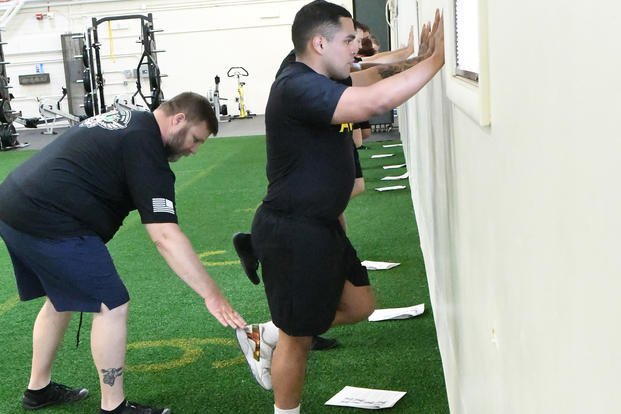It never fails. As weather outside improves, more people start running again and, within 3-4 weeks, are experiencing running pains. If you are nursing an injury like shin splints or tendinitis, a great alternative to a running workout is getting on the bike. Over the years, I have personally done the following week of bike-riding workouts and came back better on my runs.
If you can train on a rubberized track or on the inside of the track on grass or turf, you may help with some of the impact pains that running on harder ground or pavement can produce.
You can avoid injury by being smart and mixing in some non-impact cardio, progress logically with your weekly running miles at first (5-8 miles per week) and build up about 10% each week as long as there is no pain in the feet, legs or back.
But if you're already experiencing pain and have to take a 1.5-mile timed run soon, try the combination of leg PT, bike pyramids and Tabata intervals as described below. As you prepare for a military fitness test, the bike workout goal is to get your heart rate high for as long or longer than you will have to run for time.
Monday and Friday: Do a 20-minute bike pyramid, with each minute on the minute increasing resistance by one level until you can no longer maintain 70-80 rpm pedaling. Continue for a total of 20 minutes, even if you have to reduce the resistance in the later half of the workout.
Tuesday and Thursday: Do 3x10-minute Tabata intervals (20-second sprint/10 seconds easy) with a two-minute rest between each of the three sets. Push hard on the sprints and work on your breathing to recover as best you can in the 10 seconds easy sections.
Wednesday and Saturday: Add lunges and squats calisthenics to maintain leg stamina. You can mix these exercises into a 30-minute bike ride, doing 20 squats and 10 lunges per leg every five minutes.
A bike with adjustable levels of resistance is best for the bike pyramid, but the other two workouts above can be done on any type of bike. A stationary bike is preferred for these workouts.
Easing into Group Running Workouts
When we do group running workouts, there is always someone who joins us and needs to progress into running a little slower due to athletic history or bodyweight (250 pounds plus).
In many cases, running is not the answer for these athletes. Walking, rucking or non-impact cardio will go a long way to helping build some impact durability at the same time as working the heart and lungs hard with the non-impact cardio options.
Here is the running workout we did this week that a few attempted at first and then pivoted to the bike or elliptical option:
Warm-up squat pyramid 1-10 with 50-meter runs in between:
1 squat, run 50m easy
2 squats, run 50m
3 squats, run 50m
Keep going up to level 10 and stop. Mix in some dynamic stretches during this warmup set. If there is any pain in the runners during this warmup, they move to the bike in the gym.
Repeat six times.
Run 400m at goal mile pace
- Squats 20
- Lunges 10 (each leg)
Repeat three times.
Run 800m at goal mile pace
- Lunge 100m + walk 200m
This is a three-mile run workout not counting the warmup jogs. It is a great way to work on your pace and speed for timed running events.
Eventually, you can build up to one-mile runs since the goal is to string together as many of the 400m runs at your goal time to reach your goal pace for the 1.5-mile timed run test. Try it when you can run again -- or cut the miles down to 1.5-2 miles total.
-- Stew Smith is a former Navy SEAL and fitness author certified as a Strength and Conditioning Specialist (CSCS) with the National Strength and Conditioning Association. Visit his Fitness eBook store if you're looking to start a workout program to create a healthy lifestyle. Send your fitness questions to stew@stewsmith.com.
Want to Learn More About Military Life?
Whether you're thinking of joining the military, looking for fitness and basic training tips, or keeping up with military life and benefits, Military.com has you covered. Subscribe to Military.com to have military news, updates and resources delivered directly to your inbox.


















